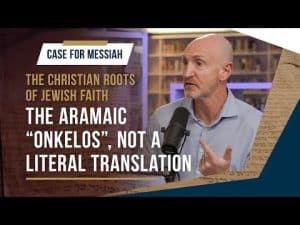December 25th: A joyful day to celebrate the Messiah coming to earth… or a hijacked pagan holiday? Does the date really matter? And how did it become 25th December anyway, since Yeshua most likely came during the Fall Feasts?
Here in Israel, Christmas is a regular working day, with the rare Christmas tree found in Christian Arab areas, and objections about idol worship whenever they come close to Jewish quarters. Messianic believers tend to downplay the holiday that celebrates the birth of our Messiah since Christian holidays have often been associated with Christian persecution of the Jewish people. It is a bit of a touchy subject. What are we supposed to make of it all?
A Biblical story
“It is in the Bible you know”, an Israeli believer reminded my friend who had recently come to faith. She was raised traditionally Jewish, and was clearly struggling with the whole idea. The obvious truth of his statement brought us all down to earth with a bump. Of course it is. The story is right there in the Bible, as plain as day.
There were no reindeer or decorated trees at that pivotal event as far as we know, but it definitely happened. Yeshua was born, shepherds were told by angels to go and worship him, and some sages from the east were guided by celestial beings to offer gifts and honor to the King of Kings. God became man and dwelt among us, just as He promised.
Why has marking this joyous event become so controversial? Many claim, with good reason, that the customs of decorating fir trees, wreaths, yule logs, and celebrations in late December are all from pagan origins, particularly, the feasts of Sol Invictus and Saturnalia. The anti-Christmas camp, keen to steer clear of anything approximating idol worship will avoid such traditions like the plague. They often say that the Bible never asks us to celebrate the incarnation, and that in any case, it’s disrespectful to honor Yeshua on a date chosen for quite different purposes – like giving your new girlfriend a birthday gift on the date of your ex-girlfriend’s birthday.
However, as we shall see, there is also good reason to say that there is nothing wrong with Christmas decorations and celebrations… or even the very date December 25th. Let me explain.
Is it pagan?
It is true that many pagans (those who do not worship the God of Abraham, Isaac, and Jacob) have worshiped false deities with certain trees, foods, and so on, but does this render those trees and foods unholy? I don’t think so. Unadvisable as it may be to eat food offered to idols, if pagans are offering lamb in their homes to their idols, it doesn’t mean you can’t cook your own lamb at home and enjoy it with your family in fellowship with the Living God of Israel. If those involved in animism use images and pictures of their ancestors to worship, it doesn’t prohibit us from having photographs of our relatives around the house. Even if they are deceased.
But what if the tradition originated with pagan practice and Byzantine Christianity tried to co-opt those holidays, neutralizing the traditions by super-imposing Christian stories over the top of existing feasts? Surely that’s not good? I would say it is debatable. If there are aspects of a culture that are not harmful, it is quite right to maintain them when we are born again; certain foods, decorations, or ways of having fun. You couldn’t stop a British Christian drinking tea, for example! Fireworks are used for all kinds of occasions and for all kinds of reasons. They are not wrong – they are neutral. The question is, what is being celebrated? The way different cultures celebrate special times is not so much the problem as the focus of the celebration itself.
There's nothing wrong with fir trees
Some point to Jeremiah 10 as a warning against taking in a Christmas tree and decorating it, but that passage is clearly talking about fashioning that tree into a carved wooden idol, and then worshiping it. Quite a different thing. There is nothing wrong with fir trees themselves, or even with decorating them in a festive manner, so long as we worship God alone.
The significance of fir trees goes way back further than any Greek or Roman tradition. In the Bible they are symbolic of eternal life, and are first mentioned in the Bible in the context of worshiping the one, true God.
David was taking the ark of the covenant up to Jerusalem and fir trees feature for the first time in the story:
“And David and all the house of Israel played before the LORD on all manner of instruments made of fir wood, even on harps, and on psalteries, and on timbrels, and on cornets, and on cymbals.” (2 Samuel 6:5)
Similarly, these fir trees (broshim in Hebrew) make up part of the temple itself (1 Kings 6). In fact, if you follow it through the Bible, fir trees represent upright and honorable worshipers of God. Here’s a verse that spells it out well:
“Ephraim shall say, What have I to do any more with idols? I have heard him, and observed him: I am like a green fir tree”. (Hosea 14:8)
What a special symbolism lies behind this evergreen tree that God created – it represents the righteous believer and eternal life! This is exactly what the incarnated Messiah came to give us as a gift – His own righteousness, and life with Him forever.
The date of December 25th
Why did the church start celebrating on December 25th? There certainly were pagan festivals around this time of year, but ancient sources show that Yeshua’s disciples were already celebrating Christmas on December 25th long before Constantine [1]. Moreover, we do not have conclusive evidence the pagan festivals were celebrated on that specific date at that point in time. It was not until 354 AD that we have any clue that Sol Invictus was celebrated on that date. By this point, the rapidly growing church was a force to be reckoned with, and scholars like Thomas J. Talley argue it is more likely that Sol Invictus was moved to that date by Roman Emperor Aurelian to compete with Christianity [2]. Saturnalia was said to be celebrated on 17th-20th December, according to ancient sources [3]. There were pagan holidays in December, yes, but there is no early evidence of them being celebrated on the 25th. In other words, it is not a verifiable fact that Christians co-opted Christmas from the pagans.
There are suggestions that Yeshua was either born in the Fall, at the Feast of Tabernacles, or during Passover in the Spring, based on calculations about when we think Zechariah the priest was serving his turn at the temple. However, priests sometimes had to serve in the temple in addition to their scheduled turns (during major feasts, for example) so we can make educated guesses, but it is difficult to pinpoint that moment. But the time of Zechariah’s encounter with the angel is not our only clue, as we shall see.
The Star of Bethlehem
Now that we have made such great strides forward with technology, we are in the very privileged position to be able to go back and look at what was happening in the night skies, thousands of years ago.
Our understanding of space, particularly the movements of the planets and stars, now enables us to literally see what was in the sky as the wise men made their way to Israel from the East. God set a giant clockwork in motion when he created the universe, and so predictable are the patterns of the skies that when Rick Larson determined he was going to get to the bottom of the odd story of the star, he made some wonderful discoveries. You can watch his fascinating documentary “The Star of Bethlehem” on YouTube, or visit his website [4] to learn more, but by his calculations, the wise men would have arrived in Jerusalem in the winter of 2 BC, and brought their gifts of gold, frankincense, and myrrh to Yeshua in Bethlehem when the star appeared to stop moving on the date of 25th December. By this point, Yeshua was no longer a newborn, but it does present another possibility about where the date might have come from.
If this is the case, then December 25th it is not a birthday celebration (Yeshua was already a toddler according to Matthew 2:11), but a time to honor the Messiah's arrival, as the wise men did.
The Bible never mentions any kind of birthday celebration for anyone, but it is appropriate to celebrate the Messiah's arrival, and 25th December is a reasonable date to do it.
Gentleness and respect
As Peter urges us in 1 Peter 3:15, gentleness and respect are important qualities to maintain if we are to be a good witness. Gentleness is also a fruit of the Spirit, and whatever our views on Christmas, if we are truly walking with God we should be full of love, joy, peace, patience, kindness, goodness, gentleness, and self-control. There is room for different approaches and opinions, different choices and practices when it comes to Christmas. The main thing is that we honor Yeshua first of all, and others as well. Paul explains this principle very well in Romans chapter 14, where he encourages us to be aware we will each be accountable before God, but not to judge others for their decisions.
“Therefore let us not judge one another from now on, but rather decide this—not to put a stumbling block or a trap in the way of a brother. I know, and am persuaded in the Lord Yeshua, that nothing is unholy in itself; but it is unholy for the one who considers it unholy…. So then let us pursue what makes for shalom and for the building up of one another.” (Romans 14:13-19)
A Christian family here in Israel once put up a wooden nativity scene in their home at Christmas, and when some Jewish neighbors came to visit, they remarked “Oooh! Are these your idols?!” Of course, a nativity scene is not a collection of idols, but a visual representation of one of the most amazing events this earth has ever seen, to remind us to worship the God who orchestrated it for us. Despite the fact the nativity scene was harmless, the family decided to celebrate Christmas without miniature figures from that point on, in order to avoid confusion or needlessly put a stumbling block before their Jewish friends. They love their unsaved friends and didn’t want to hinder the message of the good news of Jesus in any way.
But they still celebrate Christmas.
It is in the Bible, you know.
[1] John Chrysostom “Homily on the Date of Christmas”. Though an Anti-Semite, Chrysostom's writings provide evidence of how far back the date of 25th December goes, saying that had been celebrated by Christians for many years.
[2] Thomas J.Talley, The Origins of the Liturgical Year, pp.88-91, Karen B. Westerfield Tucker, “Christmas,” In The Oxford Companion to Christian Thought, ed. Adrian Hastings, p.114, Oxford: Oxford University Press, 2000.
[3] Macrobius, fifth century author, says Saturnalia was celebrated 14 days before January began in Saturnalia Book, 1.10.1-23
Thanks to research by www.inspiringphilosophy.org
[4] www.bethlehemstar.com
Photo by Rodion Kutsaev on Unsplash














